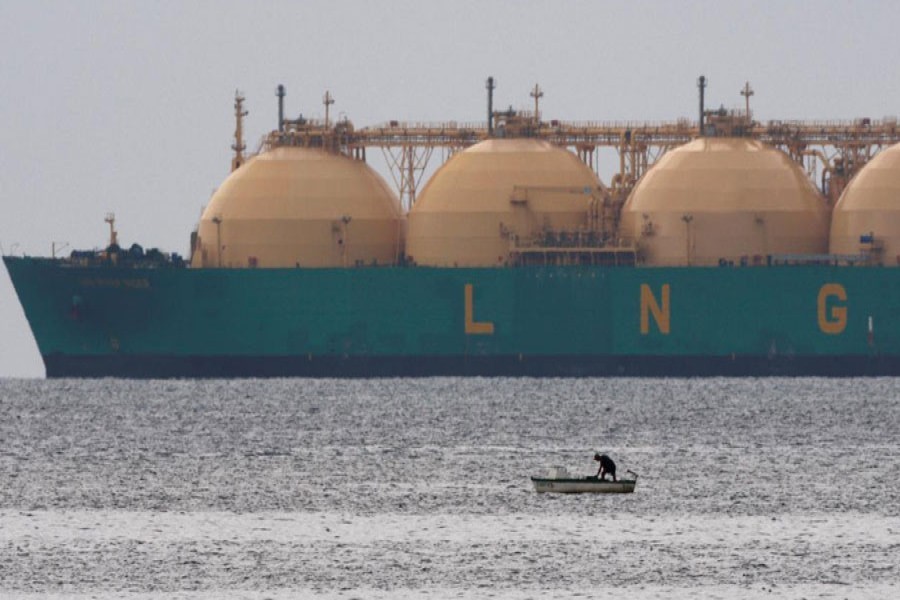The government has adopted a go-slow strategy to sign sales and purchase agreements (SPAs) with LNG suppliers as necessary infrastructure to 'evacuate' the fuel is not ready yet, officials said.
They said the market for consuming the liquefied natural gas (LNG) was also inadequately ready, prompting the government high-ups to dawdle the final deal signing procedure.
Moreover, they added, signing of master sales agreements (MSAs) with already short-listed 30 firms to purchase LNG from spot market would also take longer-than-expected time.
Initial deals and memorandum of understandings (MoUs) to import the energy were, however, inked with half a dozen global suppliers during a period of last one year.
The government has so far inked only one SPA with RasGas of Qatar to import around 2.50 Mtpa of LNG.
It has taken the go-slow strategy due to delay in construction of necessary transmission pipeline to evacuate the re-gasified LNG, a senior official at Energy and Mineral Resources Division (EMRD) told the FE Tuesday.
He also pointed out that the market was not ready yet to absorb the imported energy.
One LNG receiving terminal having a capacity of 500 million cubic feet per day (mmcfd) is expected to be readied by next month, followed by another one with similar capacity by October next.
Only half the capacity of the first terminal could be used now with the existing transmission pipeline. The country is expecting the first LNG cargo in April 2018.
Officials said the government considered that it would have to make a 'capacity payment' to the terminal operators as the evacuation pipeline is unlikely to be prepared before readying the terminal.
If the government signs SPAs with the prospective suppliers now, it also might have to pay some sort of demurrage for not taking the contracted LNG delivered, they said.
"We want to see the consequences before inking too many SPAs that are binding deals," a senior official at state-run Petrobangla said. "We want to see smooth entry of LNG into the country's energy market."
More than a month ago, Petrobangla initialed two separate deals with Oman's state-run enterprise Oman Trading International and Switzerland-based private firm AOT Energy AG to import around 2.25 Mtpa of LNG.
It also inked a letter of intent (LOI) deal with Indonesia's Petramina to import 1.0Mtpa of LNG early last month.
Gunvor Singapore Pte Ltd is among several other firms that inked MoU (memorandum of understanding) with Petrobangla to supply LNG to Bangladesh under term deals.
The delay in construction of a 30-kilometre 42-inch diameter Anwara-Fouzdarhat gas transmission pipeline has pushed the government at 'capacity payment' risk from the day one of starting commercial operation of the country's first LNG import terminal.
Officials concerned fear the pipeline is unlikely to get ready before starting operation of the FSRU (floating, storage and re-gasification unit), expected next month (April).
It will be possible to evacuate only 250 mmcfd of the re-gasified liquefied national gas (LNG) capacity from the day one with the existing gas pipeline in the region.
US-based Excelerate Energy Bangladesh Ltd is now at final stage of constructing the FSRU-based LNG terminal, having a capacity to re-gasify 500 mmcfd equivalent of LNG.
On the other hand, the government could not yet complete necessary infrastructure to evacuate the entire quantity of re-gasified LNG to be produced at the terminal.
The Karnaphuli Gas Distribution Company Ltd (KGDCL), the state-run distribution company for Chittagong region, could be able to consume only around 250 mmcfd of natural gas as the port city does not have significant number of new industries or extensions over the past one decade, said a senior KGDCL official.
Additional re-gasified LNG to consumers beyond the Chittagong region could not be possible if the Anwara-Fouzdarhat pipeline is not constructed.
Petrobangla inked the country's first ever SPA with RasGas to buy annually around 2.5 million tonnes of lean LNG over 15 years on September 25 last year.
During the initial five years of the deal, RasGas will supply annually around 1.8 million tonne of LNG, which will increase upto 2.5 million tonne annually in next 10 years, said a senior Petrobangla official quoting the terms of the SPA.
The purchase price has been set at around 12.65 per cent of the three-month average price of Brent crude oil plus US$0.50 constant per MMBTu (1 million British thermal units), he said.
If Petrobangla has more demand during the first five years, it can increase the LNG import volume annually to 2.5 million tonne and during the next 10 years Petrobangla has the option to reduce the amount by 10 per cent every year, according the terms of the SPA.
If Bangladesh takes less than the base amount of LNG, in any year, it will have to pay the price on a take-or-pay basis.
Bangladesh will be receiving LNG in floating terminals and its first LNG import terminal, a 3.75 million tonne per year FSRU being developed by US-based Excelerate Energy, is expected to be commissioned in April and its second, also with a capacity of 3.75 million tonne per year, being developed by Summit Group, is expected to be commissioned by October.


